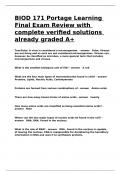Biod 171 portage learnin - Study guides, Class notes & Summaries
Looking for the best study guides, study notes and summaries about Biod 171 portage learnin? On this page you'll find 377 study documents about Biod 171 portage learnin.
Page 2 out of 377 results
Sort by
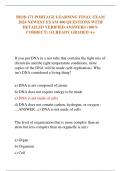
-
BIOD 171 PORTAGE LEARNING FINAL EXAM 2024 NEWEST EXAM 400 QUESTIONS WITH DETAILED VERIFIED ANSWERS (100% CORRECT) /ALREADY GRADED A+
- Exam (elaborations) • 140 pages • 2024
-
- $17.99
- + learn more
BIOD 171 PORTAGE LEARNING FINAL EXAM 2024 NEWEST EXAM 400 QUESTIONS WITH DETAILED VERIFIED ANSWERS (100% CORRECT) /ALREADY GRADED A+
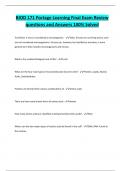
-
BIOD 171 Portage Learning Final Exam Review questions and Answers 100% Solved
- Exam (elaborations) • 25 pages • 2024
- Available in package deal
-
- $15.99
- + learn more
BIOD 171 Portage Learning Final Exam Review questions and Answers 100% Solved True/False. A virus is considered a microorganism. - False, Viruses are not living and as such are not considered microorganisms. Viruses can, however, be classified as microbes, a more general term that includes microorganisms and viruses. What is the smallest biological unit of life? - A cell What are the four main types of macromolecules found in cells? - Proteins, Lipids, Nucleic Acids, Carbohydrates ...
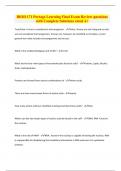
-
BIOD 171 Portage Learning Final Exam Review questions with Complete Solutions rated A+
- Exam (elaborations) • 25 pages • 2024
- Available in package deal
-
- $9.99
- + learn more
BIOD 171 Portage Learning Final Exam Review questions with Complete Solutions rated A+ True/False. A virus is considered a microorganism. - False, Viruses are not living and as such are not considered microorganisms. Viruses can, however, be classified as microbes, a more general term that includes microorganisms and viruses. What is the smallest biological unit of life? - A cell What are the four main types of macromolecules found in cells? - Proteins, Lipids, Nucleic Acids, Carbohydrates P...
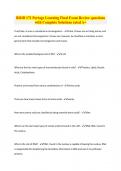
-
BIOD 171 Portage Learning Final Exam Review questions with Complete Solutions rated A+
- Exam (elaborations) • 25 pages • 2024
- Available in package deal
-
- $11.48
- + learn more
BIOD 171 Portage Learning Final Exam Review questions with Complete Solutions rated A+ True/False. A virus is considered a microorganism. - False, Viruses are not living and as such are not considered microorganisms. Viruses can, however, be classified as microbes, a more general term that includes microorganisms and viruses. What is the smallest biological unit of life? - A cell What are the four main types of macromolecules found in cells? - Proteins, Lipids, Nucleic Acids, Carbohydrate...
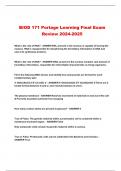
-
BIOD 171 Portage Learning Final Exam Review 2024-2025
- Exam (elaborations) • 20 pages • 2024
- Available in package deal
-
- $9.99
- + learn more
BIOD 171 Portage Learning Final Exam Review ...

-
BIOD 171 Portage Learning Final Exam Review 2024
- Exam (elaborations) • 20 pages • 2024
- Available in package deal
-
- $13.49
- + learn more
BIOD 171 Portage Learning Final Exam Review 2024 True/False. A virus is considered a microorganism. -Answer-False, Viruses are not living and as such are not considered microorganisms. Viruses can, however, be classified as microbes, a more general term that includes microorganisms and viruses. What is the smallest biological unit of life? -Answer-A cell What are the four main types of macromolecules found in cells? -Answer-Proteins, Lipids, Nucleic Acids, Carbohydrates Proteins are forme...

-
BIOD 171 Portage Learning Final Exam Review questions with Complete Solutions rated A+
- Exam (elaborations) • 25 pages • 2024
-
- $11.49
- + learn more
True/False. A virus is considered a microorganism. - False, Viruses are not living and as such are not considered microorganisms. Viruses can, however, be classified as microbes, a more general term that includes microorganisms and viruses. What is the smallest biological unit of life? - A cell What are the four main types of macromolecules found in cells? - Proteins, Lipids, Nucleic Acids, Carbohydrates Proteins are formed from various combinations of - Amino acids There are how many kno...
BIOD 171 Portage Learning Final Exam Review with complete verified solutions already graded A+.

-
BIOD 171 PORTAGE LEARNING MICROBIOLOGY FINAL EXAM REAL AND ACCURATE 2023/2024 | 2 DIFFERENT VERSIONS| GUARANTEED PASS | GRADED A
- Exam (elaborations) • 16 pages • 2024
-
- $19.99
- + learn more
BIOD171 PORTAGE LEARNING MICROBIOLOGY FINAL EXAM REAL AND ACCURATE 2023/2024 | 2 DIFFERENT VERSIONS| GUARANTEED PASS | GRADED A. Describe the energy transfer process relative to both ATP and ADP. ATP has the energy (phosphate group) to donate while ADP can accept energy in the form of a phosphate group. Thus, ATP can be reduced (ATP →ADP + Pi) while ADP can be built into ATP (ADP + Pi →ATP).
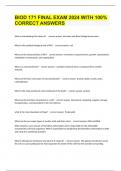
-
BIOD 171 Portage Learning Final Exam Review 2024 with 100% correct answers
- Exam (elaborations) • 17 pages • 2024
-
- $13.49
- + learn more
True/False. A virus is considered a microorganism. - correct answer False, Viruses are not living and as such are not considered microorganisms. Viruses can, however, be classified as microbes, a more general term that includes microorganisms and viruses. What is the smallest biological unit of life? - correct answer A cell What are the four main types of macromolecules found in cells? - correct answer Proteins, Lipids, Nucleic Acids, Carbohydrates Proteins are formed from various...

That summary you just bought made someone very happy. Also get paid weekly? Sell your study resources on Stuvia! Discover all about earning on Stuvia



